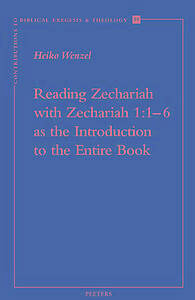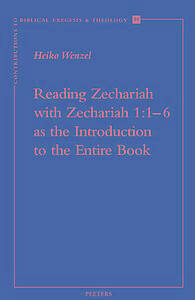
- Afhalen na 1 uur in een winkel met voorraad
- Gratis thuislevering in België vanaf € 30
- Ruim aanbod met 7 miljoen producten
- Afhalen na 1 uur in een winkel met voorraad
- Gratis thuislevering in België vanaf € 30
- Ruim aanbod met 7 miljoen producten
Zoeken
Reading Zechariah with Zechariah 1:1-6 as the Introduction to the Entire Book
H Wenzel
€ 45,00
+ 90 punten
Omschrijving
, In light of the widely acknowledged phenomenon that Zechariah refers to previous Scripture, this thesis demonstrates that these references can significantly contribute to Zechariah's argument by drawing on Mikhail M. Bakhtin's insight of the dialogical orientation of words. The dialogical orientation of Zechariah's word with regard to previous Scripture and Zechariah's audience establishes Zech 1:16 as the introduction to the entire book. It also develops a theology of transition and of waiting. Seven case studies demonstrate that the call of Zechariah 1:3-4 sounds through the entire book. The call to be different from the ancestors in a time of waiting emphasizes the people's responsibility to live faithfully within the Sinai covenant. It also points to the prophetic function of the so-called apocalyptic notions in Zechariah and exhibits Zechariah's specific contribution to the Book of the Twelve, to the Old Testament and for the church
Specificaties
Betrokkenen
- Auteur(s):
- Uitgeverij:
Inhoud
- Aantal bladzijden:
- 340
- Taal:
- Engels
- Reeks:
- Reeksnummer:
- nr. 59
Eigenschappen
- Productcode (EAN):
- 9789042924543
- Verschijningsdatum:
- 7/02/2011
- Uitvoering:
- Paperback
- Formaat:
- Trade paperback (VS)
- Afmetingen:
- 147 mm x 229 mm
- Gewicht:
- 544 g

Alleen bij Standaard Boekhandel
+ 90 punten op je klantenkaart van Standaard Boekhandel
Beoordelingen
We publiceren alleen reviews die voldoen aan de voorwaarden voor reviews. Bekijk onze voorwaarden voor reviews.











